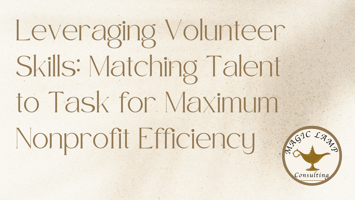Leadership in the nonprofit sector is a complex journey that demands a unique blend of vision,...
Grant Reporting and Evaluation: Demonstrating Impact and Ensuring Continued Funding
.png?width=960&height=540&name=Grant%20Reporting%20And%20Evaluation%20Demonstrating%20Impact%20And%20Ensuring%20Continued%20Funding%20(1).png) Securing a grant is a significant achievement for nonprofit organizations. However, the grant journey does not end with the funds being awarded. Grant reporting and evaluation are essential steps in maintaining positive relationships with funders, showcasing impact, and ensuring ongoing financial support. Below we will explore the importance of grant reporting and evaluation, discuss effective strategies for demonstrating impact, and highlight how nonprofits can leverage these processes to secure continued funding for their essential work.
Securing a grant is a significant achievement for nonprofit organizations. However, the grant journey does not end with the funds being awarded. Grant reporting and evaluation are essential steps in maintaining positive relationships with funders, showcasing impact, and ensuring ongoing financial support. Below we will explore the importance of grant reporting and evaluation, discuss effective strategies for demonstrating impact, and highlight how nonprofits can leverage these processes to secure continued funding for their essential work.
Establishing a Reporting Framework
At the beginning of a grant-funded project, it is crucial to establish a comprehensive reporting framework. This framework outlines the reporting requirements, deadlines, and data collection methods. It ensures that relevant information is collected consistently and enables efficient reporting throughout the project's lifecycle. Clear communication between the grantee and the grantor is essential to align expectations and address any concerns or challenges that may arise.
Collecting Impactful Data
To demonstrate the true impact of a project, nonprofits need to collect both qualitative and quantitative data. Quantitative data includes measurable metrics, such as the number of beneficiaries reached, outcomes achieved, or funds disbursed. Qualitative data captures the stories, testimonials, and personal experiences that highlight the human impact of the project. Collecting data through surveys, interviews, case studies, and other methods ensures a comprehensive understanding of the project's outcomes and helps shape the narrative of its success.
Sharing Success Stories
Grant reporting provides an opportunity to showcase success stories and real-life examples that illustrate the impact of the project. These stories can be shared through written reports, videos, testimonials, or multimedia presentations. Highlighting individual success stories humanizes the project's achievements, enabling funders to connect emotionally with the cause and witness the tangible difference their support has made. Sharing compelling stories not only highlights the impact but also fosters a sense of gratitude and appreciation among funders, strengthening the relationship between the grantee and the grantor.
Evaluating and Learning
Evaluation is a crucial aspect of grant reporting that allows nonprofits to learn from their experiences, identify areas for improvement, and enhance the effectiveness of their programs. Regular evaluation helps measure progress against set goals and objectives, assess the efficiency of strategies and interventions, and adapt approaches as necessary. By conducting evaluations, nonprofits can identify successful practices to replicate, address challenges encountered during the project, and refine their programmatic strategies. Demonstrating a commitment to learning and improvement through evaluations enhances credibility and assures funders that their investment is being utilized effectively.

Understanding Grant Reporting and Evaluation
Grant reporting involves providing detailed updates on the progress, outcomes, and financial management of a funded project to the grantor. It demonstrates accountability and transparency, showcasing the funds are being utilized as intended.
Sustaining Relationships and Securing Continued Funding
Effective grant reporting and evaluation are important in maintaining positive relationships with funders and ensuring continued financial support. By providing timely and comprehensive reports, nonprofits demonstrate their professionalism, accountability, and dedication to transparency. Engaging in open communication with funders, seeking feedback, and addressing any concerns or challenges that arise fosters a collaborative relationship built on trust and mutual respect. Moreover, by showcasing the impact of their work through robust reporting and evaluation, nonprofits position themselves as valuable partners in achieving shared goals, increasing the likelihood of continued funding for future projects.



